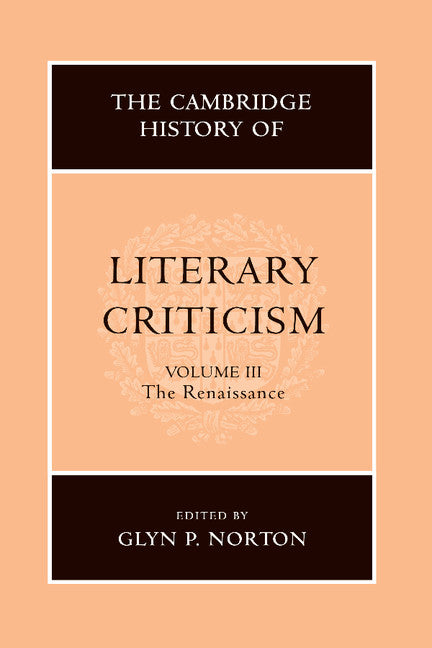Freshly Printed - allow 8 days lead
Couldn't load pickup availability
The Cambridge History of Literary Criticism: Volume 3, The Renaissance
This 1999 volume is the standard work of reference on early modern literary criticism in Europe.
Glyn P. Norton (Edited by)
9780521317191, Cambridge University Press
Paperback, published 6 July 2006
786 pages
22.5 x 15.7 x 3.9 cm, 1.05 kg
'…it will prove to be an invaluable resource for scholars of the early modern period, and will doubtless become a standard work of reference.' Scott Nixon, Review of English Studies
This 1999 volume was the first to explore as part of an unbroken continuum the critical legacy both of the humanist rediscovery of ancient learning and of its neoclassical reformulation. Focused on what is arguably the most complex phase in the transmission of the Western literary-critical heritage, the book encompasses those issues that helped shape the way European writers thought about literature from the late Middle Ages to the late seventeenth century. These issues touched almost every facet of Western intellectual endeavour, as well as the historical, cultural, social, scientific, and technological contexts in which that activity evolved. From the interpretative reassessment of the major ancient poetic texts, this volume addresses the emergence of the literary critic in Europe by exploring poetics, prose fiction, contexts of criticism, neoclassicism, and national developments. Sixty-one chapters by internationally respected scholars are supported by an introduction, detailed bibliographies for further investigation and a full index.
Introduction
Part I. Reading and Interpretation: An Emerging Discourse of Poetics: 1. Theories of language
2. Renaissance exegesis
3. Evangelism and Erasmus
4. The assimilation of Aristotle's Poetics in sixteenth-century Italy
5. Horace in the sixteenth century: commentators into critics
6. Cicero and Quintilian
Part II. Poetics: 7. Humanist classifications of poetry among the arts and sciences
8. Theories of poetry: Latin writers
9. Literary imitation in the sixteenth century: writers and readers, Latin and French
10. Petrarchan poetics
11. Translatio and translation in the Renaissance: from France to Italy
12. Invention
13. Humanist education
14. Second rhetoric and the grands rhetoriqueurs
15. The rhetoric of presence: art, literature, and illusion
16. The paradoxical sisterhood: 'ut pictura poesis'
17. Conceptions of style
18. Sir Philip Sidney's An apology for poetry
19. Aristotle, Horace, and Longinus: the conception of reader response
20. Italian epic theory
21. The lyric
22. Renaissance theatre and the theory of tragedy
23. Elizabethan theatrical genres and literary theory
24. Defining comedy in the seventeenth century: moral sense and theatrical sensibility
25. Dialogue and discussion in the Renaissance
26. The essay as criticism
27. The genres of epigram and emblem
28. Humour and satire in the Renaissance
Part III. Theories of Prose Fiction: 29. Theories of prose fiction in England: 1558–1700
30. Theories of prose fiction in sixteenth-century France
31. Seventeenth-century theories of the novel in France: writing and reading the truth
32. Theories of prose fiction and poetics in Italy: novella and romanzo (1525–96)
Part IV. Contexts of Criticism: 33. Criticism and the metropolis: Tudor-Stuart London
34. Criticism in the city: Lyons and Paris
35. Culture, imperialism, and humanist criticism in the Italian city-states
36. German-speaking centres and institutions
37. Courts and patronage
38. Rooms of their own: literary salons in seventeenth-century France
39. Renaissance printing and the book trade
Part V. Voices of Dissent: 40. The Ciceronian controversy
41. Reorganizing the encyclopedia: Vives and Ramus on Aristotle and the scholastics
42. The rise of the vernaculars
43. Ancients and Moderns: France
44. Women as auctores in early modern Europe
Part VI. Structures of Thought: 45. Renaissance Neoplatonism
46. Cosmography and poetics
47. Natural philosophy and the 'new science'
48. Stoicism and Epicureanism: philosophical revival and literary repercussions
49. Calvinism and post-Tridentine developments
50. Port-Royal and Jansenism
Part VII. Neoclassical Issues - Beauty, Judgement, Persuasion, Polemics: 51. Combative criticism: Jonson, Milton, and classical literary criticism in England
52. The rhetorical ideal in seventeenth-century France
53. Cartesian aesthetics
54. Principles of judgement: probability, decorum, taste, and the je ne sais quoi
55. Longinus and the Sublime
Part VIII. Survey of National Developments: 56. Seventeenth-century English literary criticism: classical values, Engish texts and contents
57. French criticism in the seventeenth century
58. Literary critical developments in sixteenth- and seventeenth-century Italy
59. Cultural commentary in seventeenth-century Spain: literary theory and textual practice
60. The German-speaking countries
61. The Low Countries
Bibliography
Index.
Subject Areas: Literary theory [DSA], Literature: history & criticism [DS]


